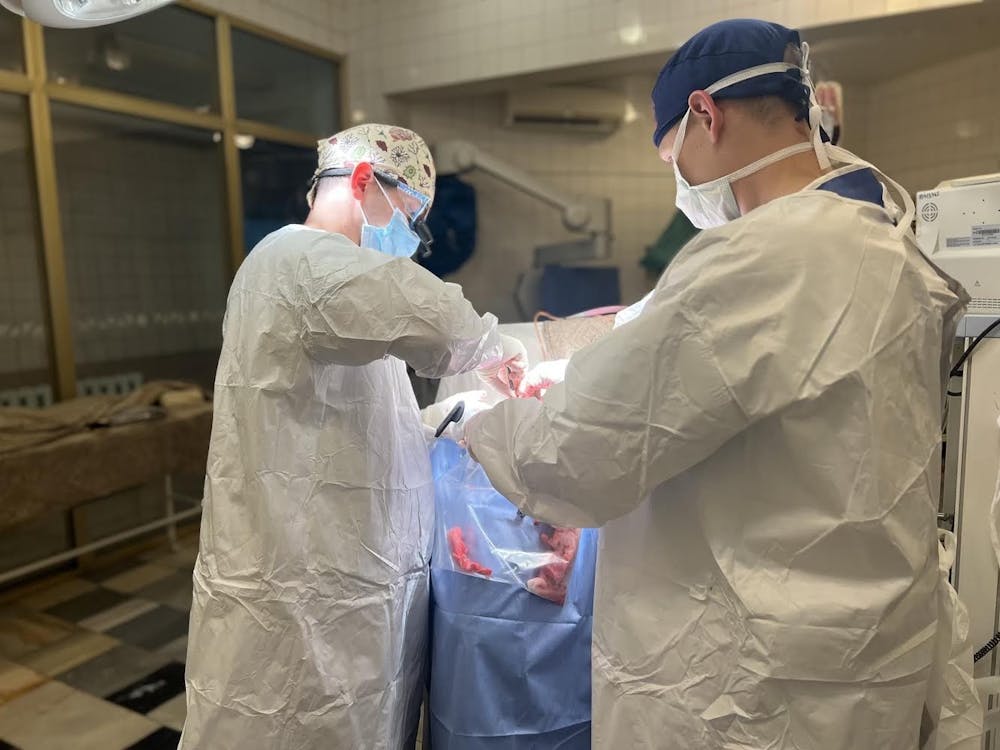Medicine runs in Dr. Connor Berlin’s family. A fourth-year Neurosurgery resident at the U.Va. Hospital, Berlin has found himself performing lifesaving work outside of just the state and even the country — all thanks to a piece of family history.
A year ago, the trajectory of Berlin’s career changed when he discovered that his grandfather had been a community healer in Ukraine, someone who set broken bones or treated wounds for those suffering in the area. Both his grandmother and grandfather faced horrific anti-Semitic violence in Europe.
Berlin was deeply affected by this story, and ended up on a three-week volunteer trip to the country in July.
“[That story] made me really want to go back to the country of my ancestors,” Berlin said. “I wanted to make a point of saying that if I can find it in my heart to go back to this country with my ancestors’ history and help out with this war effort, then maybe other people would be inspired to go do this same.”
Ukraine is still facing the devastating effects of the Russian invasion — today, troop deaths and injuries near half a million. Berlin’s trip was sponsored by Razom, a non-profit organization started in 2014 when Russia first invaded Ukraine and seized Crimea.
The landscape in Ukraine was far different from what Berlin was used to in Charlottesville, and he said he had to adjust to the level of trauma surgeries. He credits neurosurgeon Rocco Armando for helping prepare and ease his nerves before the trip, since Armando had also done brain surgery in Ukraine and Iraq.
“It's unlike anything you'll see in the United States and the sheer number of those injuries that we're seeing are far outpace what we saw in Iraq and Afghanistan,” Berlin said.
Berlin said that approximately 70 percent of the neurosurgical patients that he treated were polytrauma patients — or patients with several injuries, ranging from shrapnel in their legs to collapsed lungs and burn wounds. A lot of the surgery Berlin conducted went beyond simple fractures or tears.
“We're doing complex facial repairs, repairs of the [orbital bone] and skull base — [an area] of the skull where a lot of important blood vessels and nerves are that come out of the brain,” Berlin said. “It’s a very hard area of the brain to reach and a complex fracture.”
To manage the inflow of injuries, Berlin’s team often performed elective surgeries during the day and then received injured soldiers from ambulances at night. Many elective surgeries were performed on civilian populations who required medical attention for conditions such as life-threatening brain tumors.
The civilian population, Berlin said, still attempts to resume normal day-to-day activities of everyday life.
“In Ukraine, people are still going out and enjoying themselves by going to cafes, having a coffee or having a beer with friends,” Berlin said. “It's definitely not a fully normal life, because there is always an element of fear.”
Berlin said he would receive daily notifications from air raid apps that notify people when Russian missiles have launched. However, he said that he and his colleagues were prepared to remain in the operating room whether a missile was being launched or not.
“We're here to do a job, and while healthcare workers didn't sign up to sacrifice their lives, I voluntarily went to Ukraine knowing the risks and those are risks that I accepted,” Berlin said.
Ukraine is still facing a shortage of medics on the frontlines and doctors to train them, Berlin said. Non-profit organizations look for surgeons or clinicians especially to help train Ukranian doctors, and Berlin noted that volunteering abroad is a unique opportunity for students in the medical field to expand their skill set outside of the classroom while responding to a significant humanitarian crisis. Berlin also hopes to one day return himself.
“I wish I could have stayed for longer and I think that is my only regret,” Berlin said. “These are genuinely good people that need our help, and we should be doing everything to help them.”







